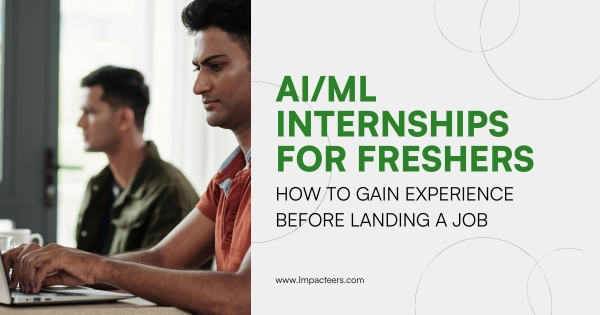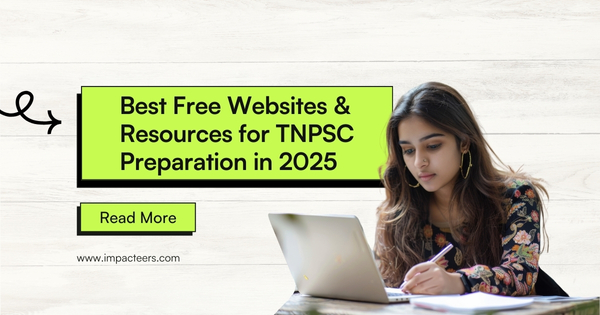Artificial intelligence internship programs give freshers the chance to work on real-world AI projects and boost their career prospects.
If you’re just starting out in the world of AI, you’ve probably faced the same frustration as thousands of other freshers: every job description seems to ask for “1–2 years of experience.” But how do you get that experience when no one’s willing to hire you in the first place?
This is exactly where an artificial intelligence internship comes in. It’s not your dream role yet, but it’s the stepping stone. It gives you the opportunity to put what you learned to practice, get real projects under your belt, and above all, demonstrate to employers that you’re actually able to do the job.
An AI internship (or ML internship) will typically last a couple of months, but the confidence and skills that you’ll gain will stick with you for life. You’ll be taught how to meet deadlines, deal with dirty datasets, and function as part of a team.
And trust me, those things matter far more than just acing multiple-choice quizzes in an online course.
Visit Us >>> https://www.impacteers.com/home
What Is an Artificial Intelligence Internship?
At its core, an artificial intelligence internship is a temporary role where you assist a company, research lab, or startup in building AI/ML solutions. Unlike college projects where you control everything, here you step into the chaos of real work.
Depending on where you intern, you might:
- Collect and clean raw data (it’s rarely neat or “ready to use”).
- Train and fine-tune ML models.
- Run experiments to check model accuracy.
- Document findings and share them with your team.
- Contribute to actual business applications, like chatbots or recommendation engines.
Some internships happen on-site in an office, while others are online internships, where you log in remotely and collaborate over Slack or Zoom. For freshers, both are valuable—the important thing is exposure.
Why Freshers Should Care About Internships
Now you might ask, “Do I really need an internship? Can’t I just keep learning from YouTube or Coursera?” Sure, you can, but here’s the thing—employers want more than just certificates.
Here’s why internships matter so much:
- Hands-on learning – You finally see how theory plays out in practice.
- Portfolio building – Those projects you work on can go straight into your resume or GitHub.
- Networking – You meet mentors and peers who can open doors later.
- Better job chances – A fresher with internship experience almost always gets shortlisted over someone without it.
Think of it like training wheels on a bike. You’re still learning, but you’re riding for real now.
Types of AI/ML Internships
Not every internship looks the same, and knowing the differences can help you pick the one that matches your goals.
- Research Internships – Usually in universities or labs, focusing on experiments and innovation. Great if you’re thinking of higher studies or academic careers.
- Industry Internships – At tech companies, where you work on real-world products. For example, designing an ML model for fraud detection or improving an app’s recommendation engine.
- Online Internships – Increasingly popular, especially for students outside big tech hubs. You get to work on projects remotely, which also teaches you how to collaborate virtually.
- Hybrid Internships – A mix of office and online. You go in some days, work remotely on others.
Each type has its perks, but they all give you something priceless—experience that goes on your resume.
Skills You Need Before Applying
Here’s the good news: you don’t need to be an expert before applying. Companies know freshers are still learning. But there are a few basics you should have under your belt.
Technical Skills
- Programming: Python is the most common, but R works too.
- ML libraries: Familiarity with TensorFlow, Keras, or Scikit-learn.
- Math basics: A grasp of statistics, probability, and linear algebra.
- Data handling: Pandas, NumPy, maybe even a little SQL.
- Cloud tools: AWS, GCP, or Azure exposure is a bonus.
Soft Skills
- Problem-solving – You’ll face unexpected challenges every week.
- Teamwork – You’ll be working with software engineers, analysts, and managers.
- Adaptability – Tools change quickly in AI, so you’ll need to stay flexible.
Don’t worry if you’re not strong in all of these yet. The internship itself is meant to help you grow.
Where to Find AI/ML Internships
Alright, so you’re convinced that an AI internship or ML internship is worth it. Now the big question—where do you actually find one?
Here are some good starting points:
- University Career Centers – If you’re still in college, don’t overlook this. Many companies directly reach out to colleges looking for fresh interns.
- Company Websites – Big players like Google, Microsoft, and IBM post internship roles regularly. They’re competitive, but worth applying for.
- Job Portals – LinkedIn, Internshala, Indeed, and Glassdoor are flooded with listings. Just search for “artificial intelligence internship” and filter for fresher roles.
- Startups – Don’t just chase brand names. Startups often give you more responsibility and real-world exposure.
- Specialized Platforms – This is where sites like Impacteers Jobs come in. Instead of browsing through thousands of unrelated jobs, you’ll find tech-focused listings tailored for IT professionals, including AI/ML internships.
Pro tip: Don’t just apply randomly. Keep track of your applications in a simple sheet, so you can follow up without confusion.
How to Apply and Stand Out
Here’s the reality—AI is hot right now, and so are the number of applicants. That means you’ll need to stand out from the crowd.
Some ways to do it:
- Build a portfolio – Upload your personal projects to GitHub. Even a basic image classifier or chatbot can impress if it’s well-documented.
- Highlight relevant courses – Mention certifications from Coursera, Udemy, or Kaggle competitions on your resume.
- Customize your resume – Don’t send the same generic file everywhere. Match your skills to the internship description.
- Keep it simple – Recruiters don’t want to read a 3-page resume. One page is enough if you show the right skills.
- Show eagerness to learn – In interviews, admit what you don’t know, but highlight how quickly you can pick things up.
Remember, most companies don’t expect freshers to be experts. They’re looking for enthusiasm, adaptability, and a willingness to grow.
Making the Most of Your Internship
Okay, so you got the internship. Great! But don’t just treat it as a checkbox. Use it to really level up.
Here are a few tips:
- Be proactive – Don’t sit around waiting for tasks. Ask for more work, suggest improvements, and show initiative.
- Document everything – Keep a journal of projects, problems, and solutions. Later, you can use this to update your resume or discuss in interviews.
- Ask questions – Internships are for learning. Don’t hesitate to clarify doubts, even if they seem small.
- Network – Build good relationships with mentors and peers. Many interns land full-time jobs through referrals.
Think of your internship as a trial run for your future career. The harder you work now, the easier the job hunt becomes later.
Career Opportunities After an Internship
The cool part about completing an artificial intelligence internship is the number of doors it opens. Depending on your interest and performance, you can branch out into:
- Data Analyst – Working with numbers, dashboards, and business reports.
- Junior ML Engineer – Assisting with model building and deployment.
- AI Software Developer – Building applications powered by machine learning.
- Research Assistant – Working on academic or corporate AI studies.
And as you gain more experience, you can grow into higher roles like AI Engineer, Data Scientist, or even ML Researcher. The demand is strong, and it’s only getting bigger.
Challenges Freshers Might Face
Now, I won’t sugarcoat it. Getting and completing an internship comes with its own hurdles.
- High competition – You’ll be competing with hundreds of other applicants.
- Imposter syndrome – It’s normal to feel like you don’t belong at first.
- Unpaid roles – Some internships don’t pay, or only give a small stipend.
- Steep learning curve – Real-world data and projects are messier than textbook examples.
But here’s the upside—every challenge you overcome makes you more confident and job-ready.
Why Impacteers Jobs Can Help
Here’s where I drop a little insider tip. If you’re serious about building a career in AI, don’t just rely on generic job boards. They’re crowded, confusing, and full of irrelevant roles.
That’s why platforms like Impacteers Jobs stand out. Instead of mixing IT roles with marketing or sales, it’s built specifically for tech professionals. You’ll find opportunities in AI, software development, and web development—all in one place.
For freshers looking for an AI internship or ML internship, it’s a smarter way to discover openings that actually fit your skills and career goals.

Conclusion
For freshers, landing an artificial intelligence internship is often the difference between struggling in the job market and confidence in AI career.
The internship exposes you to actual projects, helps you build a robust portfolio, and the employer demonstrates that you are capable of meeting challenges outside of the campus. Be it a research position, an industry project, or an online internship, the experience that you acquire will accelerate your career quicker.
And when you are ready to find, do not waste time only on random job boards. Use focused platforms such as impacter jobs to find internships that align with your skills and career goals.
Because in AI, starting is the most difficult step – and once you do this, the opportunity are endless.
About Us >>>> https://blog.impacteers.com/
FAQs
1. Do I need prior experience for an artificial intelligence internship?
No. Most internships are designed for freshers. As long as you know the basics of coding and have a learning mindset, you’re good to go.
2. Are online internships in AI useful?
Yes. Online internships give you flexibility and real-world exposure. Many companies now treat them on par with in-office experience.
3. How long does an AI/ML internship usually last?
Anywhere from 3 to 6 months, depending on the company and project.
4. Can internships lead to full-time jobs?
Absolutely. Many companies hire their best interns directly into entry-level jobs.
5. Where’s the best place to look for AI/ML internships?
You can try LinkedIn, company websites, and specialized portals like Impacteers Jobs, which focus on IT careers.



Post Comment